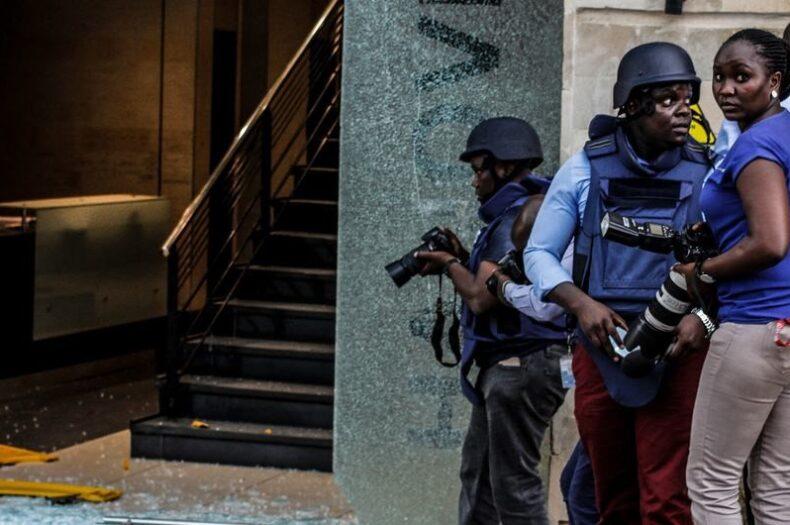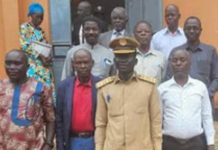Africa-Press – South-Sudan. The United Nations Educational, Scientific and Cultural Organization (UNESCO) has said at least 55 journalists had been killed in 2021 globally.
The report said nine out of 10 killings have not been resolved since 2006.
UNESCO said while hope for tides on the impunity against journalists keeps on growing that one day the vices will subside, the gravity seems to rise each year. It described the impunity as “alarmingly widespread.”
The United Nations stated in a tweet: “threats against journalists are threats against fundamental freedoms. More must be done to end impunity for crimes against journalists.”
The song continues to be sung all along for the dimming freedom of the press to overshadow injustice worldwide.
Media is considered as the fourth arm of the government in addition to the judiciary, the executive and the legislature. It spreads government policy to the public and digs out the areas of interest from locals where the government reach is limited as well as uncovering corrupt practices, bringing them to the limelight.
Ironically, in many countries, this has remained a daydream, with restricted access to information, harassment and killings, said UNESCO.
“Once again in 2021, far too many journalists paid the ultimate price to bring truth to light,” the UNESCO Director-General Audrey Azoulay said.
“Right now, the world needs independent, factual information more than ever. We must do more to ensure that those who work tirelessly to provide this can do so without fear.”
The report said that the number is the lowest for a decade but said “journalists faced high rates of imprisonment, physical attack, intimidation and harassment” in 2021 especially while reporting on protests.
Women journalists as reported by UNESCO are always at risk due to what it refers to as “a shocking prevalence of harassment online,” with approximately three-quarters of female journalists experiencing violence online.
UNESCO said that out of the journalists killed, two-thirds died in countries without armed conflict, thus showing negligence of the media freedom unlike in 2013 where two-thirds of those killed were in countries with ongoing conflict.
The regions with high numbers are Asia pacific with 23 killings and Latin America and the Caribbean with 14 deaths with the killing of a Myanmar journalist Sai Win Aung on December 25, 2021, while covering the plight of refugees in the southeastern state of Kayin.
According to UNESCO, Asia was the second to be killed in December 2021 in Myanmar. Azoulay of UNESCO condemned the killing on Wednesday last week.
“During his assignment for the Federal News Journal, he was shot in an artillery attack by the Myanmar armed forces,” said UNESCO report.
The UN agency called upon authorities to conduct a thorough investigation whenever a media professional is killed as is their mandate to ensure freedom of expression and the safety of journalists worldwide.
Breach of press freedom
South Sudan has not been left out of this with harassment, arrests, and restriction of access to information characterized by government officials refusing to give information or locking out of the media although no killing has been reported since 2017.
Last year journalists working the state-owned media South Sudan Broadcasting Cooperation (SSBC) were detained by the security agency, according to a statement released by the Union of Journalists of South Sudan.
A radio Miraya journalist, Manyang Mayom was also expelled by authorities in Warrap State claiming that his reporting were potential threats to peace and stability in the state. Also, Singaita 88.3 FM in Kapoeta, the Radio Jonglei 95.9 were shut down respectively although they were later reopened after intervention from the UJoSS.
On October 31, 2021, the president of the Union of Journalists of South Sudan (UJoSS), Oyet Patrick, called upon the government to protect journalists so that they can work in a conducive environment.
Oyet asked the government to investigate, prosecute and bring those who committed crimes against journalists to justice.
“If anyone among the journalists is harmed, his or her right is violated, the issue should not be ignored because some people say these are rumour mongers they always cause a problem. They might have been beaten because they caused a problem but the case shouldn’t be left that way the issue must be investigated and brought to a logical conclusion,” Oyet said.
“My appeal is that protection should be provided to journalists, this protection is not like extraordinary protection, and by protecting journalists you are protecting human rights which is a right of everybody,” he added.
He called on the institutions that protect media freedom like Media Authority and the Access to Information Commission to do the work they are meant to do.
“The institutions should work to make the work of journalists easy because, at the end of the day, the information that the journalists collect and provide to the public helps the public to make decisions,” he said.
Oyet said that cases of journalists killed since 2014 were still pending as the murderers remain at large. He added that there had also been cases of detention of journalists and threats across the country, in juba and other states and administrative areas.
“It is not even clear who kills them so when crimes are committed we expect the state to take action to get the people who have committed the crime to be prosecuted when they are found guilty”.
He said that such threats came from the security personnel that guard government institutions by making decisions on whether the information should be given or not unlike the government officials instructing them on what to do.
“We have more than 15 cases that somebody has been threatening not to cover stories. We had several detentions without trial, in Juba; we have about three very serious cases then in states we have several cases on threats and detention.”
The UJoSS president cited lack of resources as the major reason as to why legal actions on crimes committed against journalists drag. He revealed that there were already positive responses from the government about the protection of journalists.
Since 2014, at least 10 journalists have been killed in South Sudan. A reporter called Peter Moi was killed in August 2015 in Juba.
In October 2021, UJoSS met with the First Vice President Dr Riek Machar and appealed for the protection of journalists and a conducive environment for practising journalists.
The concern was made ahead of the international day to end impunity against journalists.
“It is the first time that [the] top leadership of the country is engaging with the Union of Journalists [to] look into the problems that are facing the journalists. We are very happy with the meeting that we held with the First Vice President,” Oyet said.
“The First Vice President told us that there are many young journalists in the country who are facing the issue of unemployment and the government is working to address it comprehensively,” he added.
The acting press secretary and the director for information and public relations Pouk Both Baluang the issue including youth employment would be presented before the council of ministers.
“Media is the fourth arm of the government the First Vice President met them to hear from them so that they can come up with the compressive report to be tabled in the council of ministers so that the government will be in a position to address youth unemployment in South Sudan,” said Baluang.
For More News And Analysis About South-Sudan Follow Africa-Press






